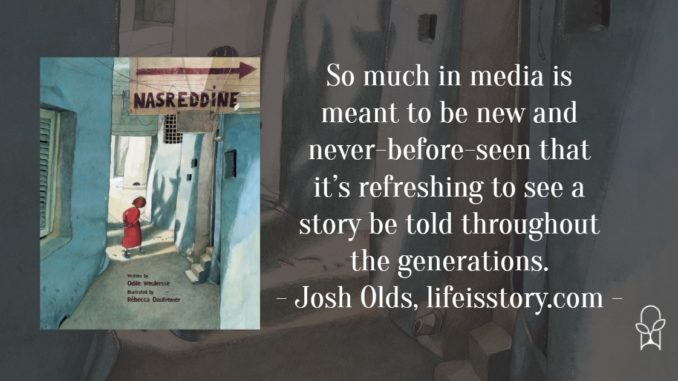
Published by Eerdmans Books for Young Readers on July 6, 2021
Genres: Children's
Buy on Amazon
Goodreads

It's time to go to market, so Nasreddine loads up the donkey and sets off with his father. But when onlookers criticize his father for riding while Nasreddine walks, the boy is ashamed. The following week, Nasreddine persuades his father to walk, and let him ride — but then people criticize the boy for making his father walk! No matter what Nasreddine tries, it seems that someone always finds something to disapprove of.
Nasreddine is a legendary character popular in stories told throughout the Middle East, and this clever story will bring him to a new audience. Accompanied by stunning artwork, this tale offers a gentle reminder to readers that it isn't always necessary to listen to the world's criticisms.
You may have heard this story before. A boy and his father need to take their goods into town. The father rides with the good on the donkey and the boy walks behind. The townspeople criticize the father for making his son walk. Every week, the two try a new configuration but every week the townspeople complain. There’s just no making them happy! This is an example of a Nasreddine story, a Middle Eastern Aesop’s Fables. In fact, this particular story also shows up in European literature as “The Miller, His Son, and The Donkey” in some versions of Aesop’s. The fable itself has no sure source. It’s first recorded by Ibn Sa’id al-Maghribi, a 13th century poet.
Odile Weulersse’s retelling in Nasreddine, some eight hundred years later, gives testament to the fable’s timeless lessons and wry humor. Many things change, but some things are always the same! Weulersse has made a name for herself by translating ancient children’s literature into modern forms and also writing her own. Mostly, these volumes have been limited to French publishers but Nasreddine now has an English version. One can only hope that Weulersse’s other works are soon to follow.
The moral of the story is that people will always find something to criticize, the question is whether or not that criticism is valid: are they making a good point or just wanting to grumble? No wonder it’s a message that’s resonated for around a millennium without becoming irrelevant. Nasreddine pays homage to the source material, tying the story to its ancient past and providing depth for the young reader. So much in media is meant to be new and never-before-seen that it’s refreshing to see a story be told throughout the generations. This version ensures that the fable will endure at least a few generations more.
